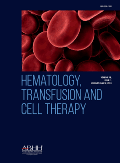
Hematology Transfusion and Cell Therapy
Scope & Guideline
Advancing knowledge in hematology and cell therapy.
Introduction
Aims and Scopes
- Hematological Disorders:
The journal covers a wide range of hematological conditions, including leukemias, lymphomas, myelomas, and other blood disorders, emphasizing both clinical and laboratory research. - Transfusion Medicine:
Research related to blood transfusion practices, safety, and efficacy, including studies on blood components, transfusion reactions, and management protocols. - Cell Therapy and Stem Cell Transplantation:
Focus on advancements in cell therapies, including hematopoietic stem cell transplantation techniques, outcomes, and challenges, particularly in resource-limited settings. - Infectious Complications in Hematology:
Exploration of infectious risks associated with hematological diseases and treatments, particularly in the context of COVID-19 and other emerging infections. - Genetic and Molecular Studies:
Research investigating genetic factors influencing hematological diseases, including molecular diagnostics, biomarkers for disease prognosis, and treatment responses. - Patient Management and Quality of Life:
Studies addressing patient care strategies, including management of symptoms, side effects of treatments, and overall patient quality of life in hematological settings.
Trending and Emerging
- Impact of COVID-19 on Hematology:
A significant increase in research addressing the effects of COVID-19 on patients with hematological conditions, including complications, treatment adaptations, and vaccination responses. - Personalized Medicine and Targeted Therapies:
Growing emphasis on studies exploring personalized treatment approaches in hematology, particularly the use of genetic markers for tailoring therapies. - Patient Blood Management Strategies:
Emerging focus on optimizing blood use in clinical settings, including protocols for minimizing transfusions and improving patient outcomes. - Innovations in Cell Therapy:
Increased interest in novel cell therapies, including CAR-T cell therapy and other advanced therapeutic modalities targeting hematological malignancies. - Health Equity and Access to Care:
Research highlighting disparities in healthcare access and outcomes for hematology patients, particularly in low- and middle-income countries. - Quality of Life Assessments:
Growing trend towards evaluating the quality of life and psychosocial impacts of hematological diseases and treatments, reflecting a holistic approach to patient care.
Declining or Waning
- Traditional Hematology Techniques:
There is a noticeable decrease in studies focusing solely on traditional hematological laboratory techniques, as advancements in molecular and genetic diagnostics gain prominence. - Basic Science Research:
Research that does not directly translate to clinical application is becoming less frequent, as the journal emphasizes studies with immediate clinical relevance. - Historical Perspectives on Hematology:
Papers focusing on historical analyses or reviews of past practices in hematology are becoming less common, reflecting a shift towards contemporary issues and innovations.
Similar Journals
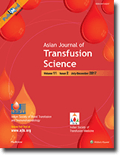
Asian Journal of Transfusion Science
Empowering research in hematology and immunology.Asian Journal of Transfusion Science, published by WOLTERS KLUWER MEDKNOW PUBLICATIONS, is a prominent open-access journal dedicated to the interdisciplinary fields of hematology and immunology. With an ISSN of 0973-6247 and E-ISSN 1998-3565, it serves as a crucial platform for researchers, clinicians, and students from around the globe, facilitating the dissemination of high-quality, peer-reviewed research. Established in 2007, the journal has consistently aimed to advance scientific knowledge in transfusion practices, enhancing patient care and safety in transfusion medicine. Despite its recent categorization in the Q4 quartile within both Hematology and Immunology, the journal is making strides toward greater visibility in the academic community, with plans for expanded reach and increased citation impact. With its commitment to open-access publishing, the Asian Journal of Transfusion Science ensures that invaluable research findings are readily accessible to all stakeholders, thereby bolstering collaborative efforts in transfusion science and related disciplines.
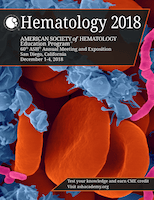
Hematology-American Society of Hematology Education Program
Exploring Innovations in Hematological ScienceHematology-American Society of Hematology Education Program is a premier peer-reviewed journal dedicated to advancing the field of hematology through comprehensive educational content. Published by the American Society of Hematology, this journal plays a crucial role in disseminating knowledge to researchers, clinicians, and students in hematology and related disciplines. With an impressive Q1 status in the field, it ranks among the top journals at the forefront of hematological research, as evidenced by its 60th percentile ranking in Scopus' Medicine - Hematology category. Although it does not offer open access, the journal provides invaluable insights and educational resources from leading experts, focusing on the latest advancements, treatment protocols, and evolving understanding of blood disorders. Covering a wide range of topics, from basic research to clinical applications, this journal is essential for anyone seeking to deepen their expertise and stay informed on the latest developments in hematology. For further engagement, readers can access insightful articles published since 2001, ensuring a rich repository of knowledge for ongoing research and clinical excellence.

GEMATOLOGIYA I TRANSFUZIOLOGIYA
Connecting Scholars to the Heart of Medical ScienceGEMATOLOGIYA I TRANSFUZIOLOGIYA is an esteemed journal published by the MINISTERSTVO ZDRAVOOKHRANENIYA in the Russian Federation, focusing on the vital fields of hematology and transfusion medicine. With a rich history dating back to its inception in 1983, the journal plays a significant role in disseminating critical research and advancements in these areas, particularly relevant given the evolving landscape of medical science. As a recognized publication, it is indexed in Scopus and holds a Q4 category ranking in Hematology for 2023, reflecting its niche but important contributions to the field. Researchers, healthcare professionals, and students can look forward to a variety of peer-reviewed articles that not only address contemporary issues but also pave the way for innovative practices in hematology. Although it does not currently offer open access, the journal remains a valuable resource for those seeking to stay informed about the latest findings and developments.
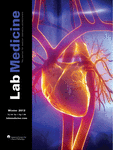
AMERICAN JOURNAL OF CLINICAL PATHOLOGY
Advancing the Frontiers of Clinical PathologyThe American Journal of Clinical Pathology, published by Oxford University Press Inc, stands as a vital resource in the fields of pathology and clinical medicine. With a rich history dating back to 1945 and an impressive impact factor reflected in its Q1 ranking in Pathology and Forensic Medicine, this journal serves as a cornerstone for researchers and professionals seeking to advance their knowledge and practice. Covering a breadth of topics within the discipline, it is recognized in 2023 as ranked #24 out of 208 in its category, highlighting its esteemed reputation within the scientific community. Although the journal does not currently offer open access, its rigorous peer-reviewed articles and cutting-edge research make it an essential addition to any academic or clinical library. The ISSN for print version is 0002-9173, with an E-ISSN of 1943-7722 available for digital access. Researchers, students, and practitioners alike will benefit from its comprehensive scope and commitment to disseminating high-quality scientific inquiry.
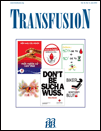
TRANSFUSION
Illuminating the Complexities of HematologyTRANSFUSION is a prestigious peer-reviewed journal published by WILEY, dedicated to advancing the field of hematology and transfusion medicine. With an ISSN of 0041-1132 and an E-ISSN of 1537-2995, this journal serves as a vital resource for researchers and professionals alike, delivering high-quality studies and reviews that impact clinical practice and blood management strategies. The journal enjoys a strong reputation, evidenced by its impressive Q1 ranking in hematology and Q2 in both immunology and allergy as of 2023. Covering foundational aspects from 1958 to 2024, TRANSFUSION not only provides valuable insights but also fosters collaboration and innovation in understanding the complexities of blood donation, transfusion practices, and immunological responses. With its significant contributions to the scientific community, this journal is essential for those seeking to stay at the forefront of research and advancements in transfusion science.

Hematologie
Driving Clinical Practice with Cutting-Edge ResearchHematologie is a highly regarded journal in the field of hematology, published by JOHN LIBBEY EUROTEXT LTD. With an ISSN of 1264-7527 and an E-ISSN of 1950-6368, this journal has established itself as a vital resource for researchers, clinicians, and students dedicated to advancing the understanding of blood disorders and treatments. Although the journal's coverage in Scopus was discontinued in 2018, it has continually provided invaluable insights and research findings. The journal aims to foster knowledge sharing and discussion in hematology, exploring innovative methodologies and emerging trends in the field. With a commitment to quality research, Hematologie remains an essential platform for disseminating critical findings that can drive clinical practice and influence future studies in hematological sciences.
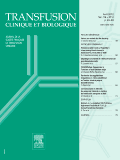
TRANSFUSION CLINIQUE ET BIOLOGIQUE
Elevating clinical practices through rigorous research.TRANSFUSION CLINIQUE ET BIOLOGIQUE, an esteemed journal published by Elsevier France - Éditions Scientifiques Médicales Elsevier, has been a pivotal resource in the fields of transfusion medicine, biochemistry, and hematology since its inception in 1994. With a strong commitment to advancing scientific knowledge, this journal provides a platform for high-quality research and clinical studies aimed at improving patient care and outcomes in transfusion practices. Although categorized in Q3 and Q4 quartiles across multiple categories in Biochemistry and Medicine for 2023, the journal holds significant potential for growth and impact within the scientific community. While it currently does not offer open access options, its indexing in reputable databases ensures visibility and reach among professionals and researchers. As the field evolves, TRANSFUSION CLINIQUE ET BIOLOGIQUE aims to continue fostering innovation and collaboration, making it a valuable tool for anyone involved in medical, biochemical, and hematological research.
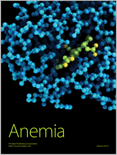
Anemia
Unlocking the mysteries of blood disorders, one study at a time.Anemia is a distinguished open-access journal published by HINDAWI LTD, focusing on the intricate and vital field of hematology and related disciplines. Since its inception in 2010, this journal has been dedicated to advancing our understanding of blood disorders, with a particular emphasis on anemia, through the dissemination of high-quality research that is freely accessible to a global audience. The journal's evolving scope from its founding through 2024 embodies its commitment to include the latest breakthroughs and methodologies in cell biology and hematological research. With its presence in prestigious databases and a tiered ranking that places it in the Q3 category in Hematology and Q4 in Cell Biology as of 2023, Anemia serves as an invaluable resource for researchers, clinicians, and students alike. The journal is indexed with a respectable position in Scopus, ranking 52 out of 137 in Hematology, highlighting its growing influence in the medical and scientific communities. With continued emphasis on open access, Anemia not only fosters collaborative research but also ensures that crucial findings reach those who need them most, enhancing educational outcomes and clinical practices worldwide.

Journal of Blood Medicine
Elevating Standards: The Premier Source for Blood Medicine InsightsThe Journal of Blood Medicine, published by DOVE MEDICAL PRESS LTD, stands as a vital resource in the field of hematology, focusing on the latest research developments and clinical advancements in blood medicine. With an impact factor reflective of its growing relevance, this open-access journal has been delivering quality scholarly work since 2010, ensuring that critical research is readily available to the global scientific community. The journal operates under an open-access model, further enhancing its dissemination and accessibility to researchers, professionals, and students alike. In the 2023 rankings, it secured a Q3 category status within hematology and achieved a commendable 76th rank out of 137 in Scopus listings, indicating its commitment to quality and innovation in this specialized area. Located in New Zealand, the journal's diverse topics encompass clinical research, treatment modalities, and emerging therapies, contributing significant insights vital for shaping future advancements in blood medicine.
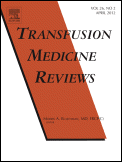
TRANSFUSION MEDICINE REVIEWS
Pioneering research for better blood health.TRANSFUSION MEDICINE REVIEWS is a prestigious journal dedicated to the advanced study of transfusion medicine and its related fields, published by W B SAUNDERS CO-ELSEVIER INC. With an outstanding reputation, it boasts an impressive impact factor and consistently ranks in the top quartile (Q1) across multiple categories, including Biochemistry (Medical), Clinical Biochemistry, and Hematology. Researchers will find valuable insights through its extensive coverage of pertinent topics, with a focus on the integration of clinical practices and laboratory science. While the journal does not currently offer open access, its content remains accessible through various institutional subscriptions, ensuring that vital information is available to the global scientific community. With a continuous publication history from 1987 to 2024, TRANSFUSION MEDICINE REVIEWS serves as a vital resource for academics, healthcare professionals, and students who seek to stay abreast of the latest research findings and clinical practices in transfusion medicine.